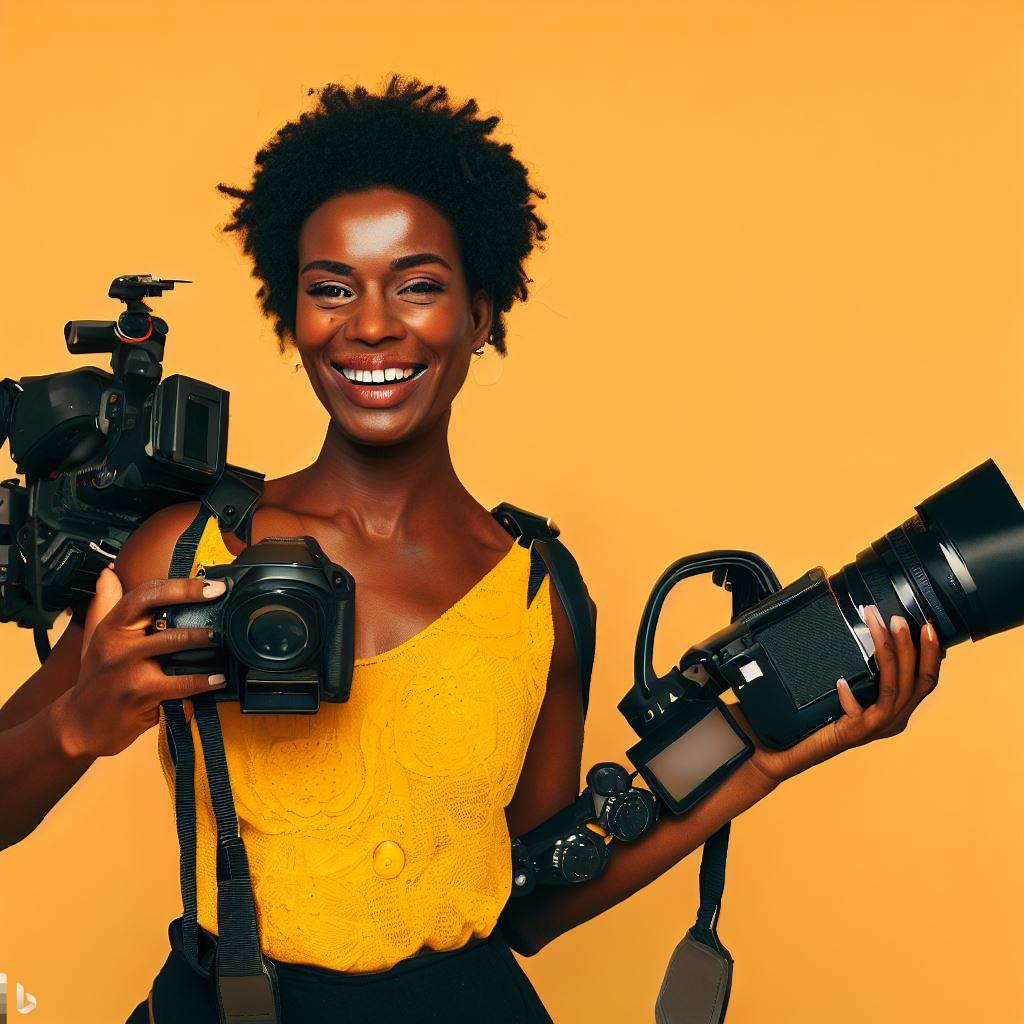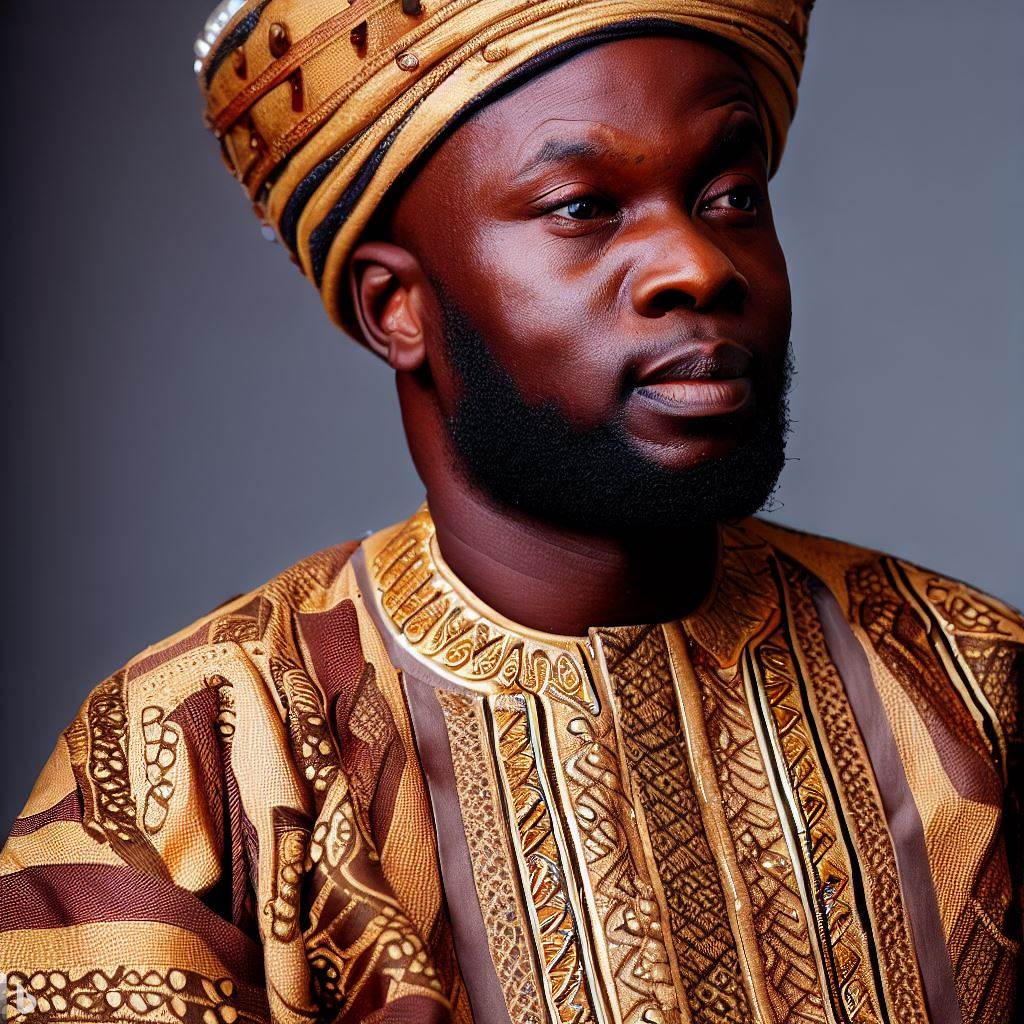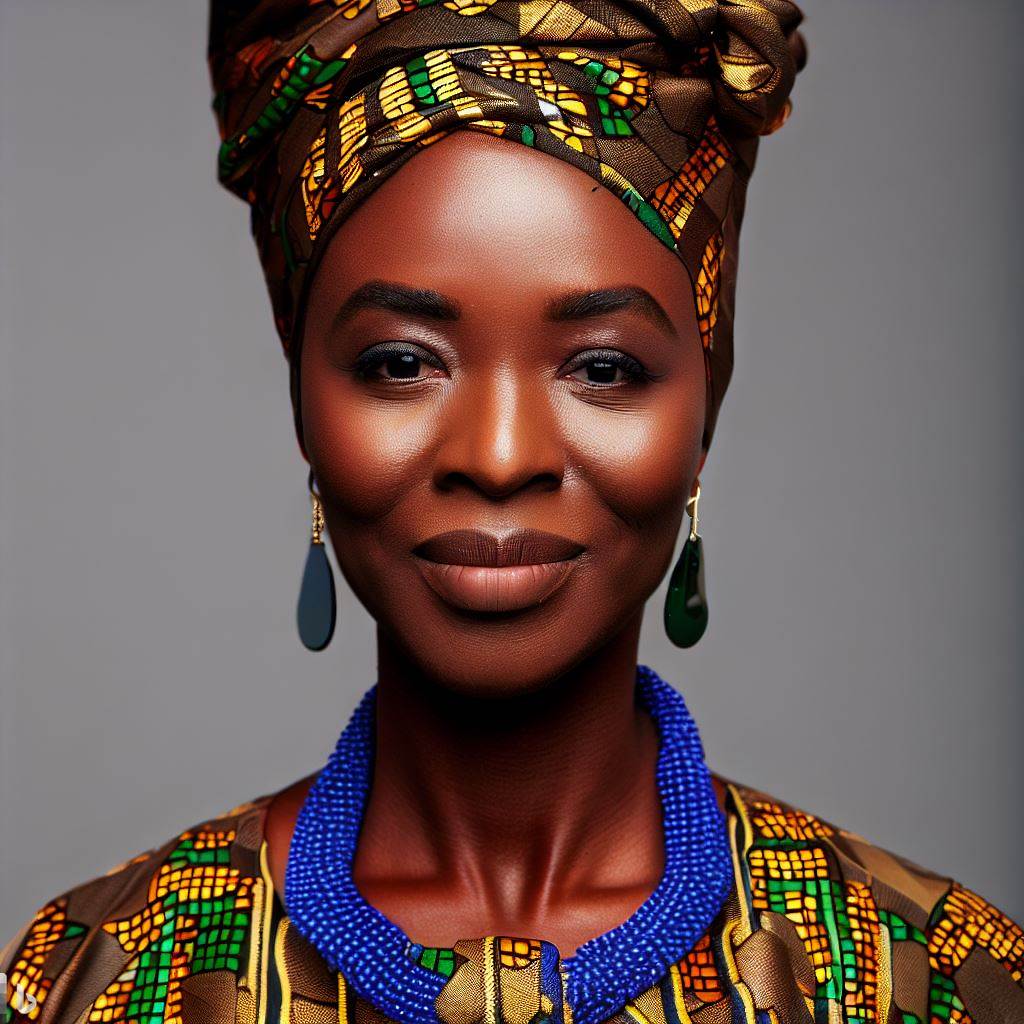Introduction
Building a portfolio is crucial for aspiring photographers in Nigeria to showcase their skills.
A portfolio is a collection of a photographer’s best work. It is essential for aspiring photographers in Nigeria to have a strong portfolio in order to showcase their skills and attract clients.
Briefly introduce the topic of building a portfolio for aspiring photographers in Nigeria
Building a portfolio can be daunting, but it is an essential step for any aspiring photographer in Nigeria. A strong portfolio will show potential clients your skills and creativity, and it will help you to land your first gigs.
Explain the importance of a portfolio in showcasing skills and attracting clients
Your portfolio is your calling card. It is the first thing potential clients will see, so it is important to make sure it is well-curated and showcases your best work.
Your portfolio should also be relevant to the type of photography you want to do. For example, if you want to be a wedding photographer, your portfolio should be filled with wedding photos.
State the purpose of the blog post
This blog post will provide tips for aspiring photographers in Nigeria on how to build a strong portfolio. It will cover topics such as:
- Choosing the right photos for your portfolio
- Organizing your portfolio
- Presenting your portfolio online
I hope this blog post will help you to build a portfolio that will impress potential clients and help you to launch your photography career.
Understanding Photography as a Medium
Photography is a dynamic medium that allows individuals to express their artistic vision through capturing images using a camera.
It combines technical skills with creativity to produce compelling visual narratives.
Overview of Photography as an Art Form
- Photography is a form of art that involves capturing and freezing a moment in time.
- It allows photographers to convey emotions, tell stories, and communicate ideas through images.
- The essence of photography lies in capturing the beauty and uniqueness of subjects from everyday life to extraordinary moments.
Different Types of Photography
- Landscape Photography: Focuses on capturing the beauty of nature, including mountains, forests, rivers, and other natural landscapes. Requires an understanding of composition, lighting, and the ability to capture the essence of a scene.
- Portrait Photography: Focuses on capturing the personality, facial expressions, and emotions of individuals. Requires effective communication and the ability to create a comfortable environment for the subject.
- Fashion Photography: Focuses on capturing clothing, accessories, and the overall style to promote fashion brands or create artistic fashion editorials. Requires an understanding of fashion trends, styling, and attention to detail.
- Wildlife Photography: Focuses on capturing animals in their natural habitat, showcasing their behavior and beauty. Requires patience, a knowledge of animal behaviors, and the ability to adapt to challenging environments.
- Street Photography: Focuses on capturing everyday life and people in public places, telling stories through spontaneous moments. Requires a keen eye for composition and the ability to blend into the surroundings to capture candid shots.
Versatility and Possibilities Within Photography
- Photographic Art: Photography can be used to create artistic pieces that evoke emotions and challenge traditional perspectives. Artists often use techniques like double exposure, long exposure, and experimental editing to create unique visuals.
- Documentary Photography: Photography has the power to document and raise awareness about social, cultural, and environmental issues. It can create powerful narratives and impact change through visual storytelling.
- Commercial Photography: Photography plays a crucial role in advertising, marketing, and product promotion. It requires an understanding of branding, visual communication, and the ability to create compelling images that resonate with the target audience.
- Photojournalism: Photography is used to capture important events and tell news stories. Photojournalists often risk their lives to capture images that inform and inspire action.
- Fine Art Photography: Photography can be exhibited in galleries and sold as limited edition prints. It allows photographers to express their creativity and personal vision, making their mark in the art world.
Basically, photography is an art form that offers endless possibilities and provides a platform for aspiring photographers in Nigeria to explore their creativity.
By understanding its various genres, aspiring photographers can focus on developing their skills in specific areas and build a diverse portfolio that showcases their unique vision and talents.
Read: Photography Equipment: A Buying Guide for Nigerian Photographers
Importance of Building a Portfolio
Having a Portfolio: Crucial for Aspiring Photographers
A portfolio is a vital tool for aspiring photographers in Nigeria as it showcases their skills and establishes credibility.
To gain recognition in the industry, photographers need to provide evidence of their talent and capabilities, and a portfolio is perfect for this purpose.
It allows potential clients and employers to see the photographer’s work, assess their style, and determine if they are a suitable fit for their needs.
A Visual Resume: Showcasing Skills and Style
A portfolio serves as a visual resume for photographers, highlighting their abilities and unique style.
By curating their best shots, photographers can present a cohesive body of work that demonstrates their technical proficiency and creative vision.
Through a portfolio, photographers can showcase their versatility in capturing various subjects, their use of lighting and composition, and their ability to tell compelling stories through images.
Furthermore, it allows photographers to show their evolution over time, as they can continually update their portfolio with new and improved work.
Attracting Potential Clients and Opportunities
A well-crafted portfolio plays a crucial role in attracting potential clients and opportunities for photographers in Nigeria.
When seeking clients or applying for photography jobs, having a portfolio instantly conveys professionalism and expertise.
Potential clients can evaluate a photographer’s style and determine if it aligns with their vision and needs.
A robust portfolio with diverse genres and high-quality imagery enhances the chances of photographers being hired for assignments or contracted for specific projects.
Moreover, a portfolio acts as a marketing tool, allowing photographers to showcase their work on various platforms, such as websites or social media.
Through online portfolios, photographers can reach a broader audience, potentially attracting international clients or collaborative opportunities.
By actively promoting their portfolio, photographers can also participate in exhibitions, competitions, and industry events, further expanding their visibility and attracting new clients.
Generally, building a portfolio is of utmost importance for aspiring photographers in Nigeria.
It serves as a visual resume, showcasing their skills, style, and ability to capture compelling images.
A well-curated portfolio establishes credibility, attracts potential clients and opportunities, and enhances professional growth in the Nigerian photography industry.
Therefore, aspiring photographers should invest time and effort in building a strong portfolio that accurately represents their capabilities and artistic vision.
Remember, a portfolio acts as a gateway to success in the photography world, allowing photographers to stand out from the competition and secure rewarding opportunities.
Read: Digital Photography in Nigeria: Trends, Tools, and Techniques
Start with Personal Projects
Building your portfolios with personal projects
Starting your photography journey with personal projects is a great way to showcase your unique perspective and style.
By working on subjects that truly interest you, you can authentically express yourself through your photographs.
Personal projects also provide the freedom to experiment and take risks, which is essential for your growth as a photographer.
The freedom and creativity in personal projects
Unlike commissioned work, personal projects allow you to have complete control over the creative process.
You have the freedom to choose your subjects, locations, and techniques.
This creative liberty enables you to push boundaries and explore new ideas, which can significantly contribute to the development of your portfolio.
Examples of personal projects that could be undertaken in Nigeria
In Nigeria, there are endless possibilities for personal projects that can help you build a compelling portfolio. Here are a few ideas to inspire you:
- Documenting Traditional Festivals: Nigeria is rich in vibrant and diverse cultural traditions. Choose a local festival that fascinates you and capture its essence through your lens.
Focus on the vibrant colors, elaborate costumes, and captivating rituals. - Exploring Street Life: Nigerian streets are teeming with life, energy, and unique characters. Roam the bustling markets, urban neighborhoods, or rural communities, and capture the candid moments that define the spirit of Nigeria.
- Showcasing Natural Wonders: Nigeria boasts breathtaking natural landscapes, from the lush rainforests to the stunning waterfalls. Venture into nature reserves or national parks and photograph the awe-inspiring beauty of Nigeria’s flora and fauna.
- Highlighting Cultural Diversity: Nigeria is known for its diverse ethnic groups, each with its distinct traditions and customs. Pick a specific tribe or region and immerse yourself in their cultural practices. Document their rituals, traditional clothing, and unique ways of life.
- Capturing Daily Life: Sometimes, the most ordinary moments can tell compelling stories. Wander through the streets of Nigerian cities or rural villages, observing and photographing the everyday routines of its people.
Focus on the human connection and the emotions that resonate in these daily interactions.
Remember, the key is to choose personal projects that resonate with you personally and that align with your photographic interests.
By working on projects that genuinely excite you, your passion and dedication will shine through in your photographs.
Building a strong portfolio takes time and dedication, but starting with personal projects will set you on the right path to success as an aspiring photographer in Nigeria.
Read: Portraits in Nigeria: Connecting Culture and Photography
Choose a Specialty
Importance of choosing a specialty within photography
One of the crucial decisions that aspiring photographers in Nigeria need to make is choosing a specialty within photography.
While some may believe that being a jack of all trades is beneficial, there are several reasons why it is important to focus on a specific niche.
Firstly, specializing in a particular area of photography allows you to develop your skills and knowledge in that specific field.
By dedicating your time and energy to a specific genre, you can become an expert in that area and produce high-quality work.
Benefits of focusing on a specific niche
Focusing on a specific niche enables you to stand out from the crowd.
In a competitive industry like photography, having a distinct specialty sets you apart from other photographers and helps you establish a unique brand identity.
Clients who are looking for a particular style or type of photography are more likely to choose a photographer who specializes in that area.
Additionally, choosing a specialty within photography can lead to a more fulfilling and enjoyable career.
When you are passionate about a specific subject or style, it becomes easier to dedicate yourself to it and constantly seek improvement.
This passion and dedication often translate into better results and client satisfaction.
Examples of photography specialties suitable for Nigeria
In Nigeria, there are numerous photography specialties suitable for aspiring photographers. One of the most popular options is wildlife photography.
Nigeria is blessed with diverse wildlife, including national parks and reserves that provide incredible opportunities for capturing stunning images of animals in their natural habitats.
Another photography niche suitable for Nigeria is traditional ceremonies.
Nigeria is a culturally rich country with a wide range of traditional ceremonies that are colorful and vibrant.
Photographers specializing in this niche can document these ceremonies and showcase the rich cultural heritage of the country.
Furthermore, fashion photography is another specialty that aspiring photographers can consider in Nigeria.
With the rise of the fashion industry in the country, there is a growing demand for talented fashion photographers who can capture the essence of Nigerian fashion and design. Architectural photography is also a viable specialty in Nigeria.
The country boasts a blend of modern and traditional architectural styles, making it an interesting subject for photographers.
From capturing the iconic structures in urban areas to documenting traditional architecture in rural locations, there are ample opportunities for photographers to excel in this niche.
Essentially, choosing a specialty within photography is crucial for aspiring photographers in Nigeria.
It allows them to develop their skills, stand out from the crowd, and pursue their passion.
Whether it’s wildlife, traditional ceremonies, fashion, or architecture, there are plenty of photography specialties suitable for capturing the essence of Nigeria.
Developing Technical Skills
Developing strong technical skills is essential for aspiring photographers in Nigeria.
While creativity and a good eye for composition are important, understanding the technical aspects of photography is equally crucial.
Ways for aspiring photographers to improve their technical skills
Here are some tips to help you improve your technical skills:
Join photography communities to learn from experienced photographers.
Engaging with fellow photographers allows you to gain insights, ask questions, and learn from their experiences.
Online communities, such as photography forums or social media groups, provide a platform to share your work, receive feedback, and discover new techniques.
Read photography books and articles to gain knowledge about different techniques.
Books written by professional photographers and online resources provide valuable information, tips, and tutorials on various aspects of photography.
Make it a habit to regularly educate yourself about different techniques, camera settings, and post-processing methods.
Experiment with different camera settings and shooting modes to understand their effects.
Take your camera out and play with different settings like aperture, shutter speed, and ISO.
Explore the impact these settings have on your images and how they can be used creatively.
Understanding the technicalities will give you better control over your shots.
Practice taking photos regularly to develop a better understanding of composition and lighting.
The more you practice, the better you become.
Take your camera with you wherever you go and capture different subjects in various lighting conditions.
This practice will sharpen your skills in framing, composition, and exposure, leading to better photographs.
Seek feedback from fellow photographers on your work to identify areas for improvement.
Embrace constructive criticism and learn from the feedback given by others.
Join photography groups or share your work with professional photographers who can provide valuable insights into improving your technical skills.
Study the work of renowned photographers to get inspiration and learn new techniques.
Analyzing the works of photographers you admire allows you to learn from their approaches.
Study their compositions, lighting techniques, and unique styles.
This exploration will expand your knowledge and inspire you to experiment with new techniques.
Photography Courses and Workshops
Additionally, taking photography courses or attending workshops is highly recommended:
- Enrolling in photography courses helps to learn the technical aspects of photography. These courses cover topics such as camera settings, exposure, lighting, composition, and post-processing.
They provide structured learning environments with experienced instructors who can guide you in honing your technical skills. - Workshops provide hands-on experience and opportunities to learn from professionals. Attending workshops allows you to gain practical knowledge and insights from seasoned photographers.
Through interactive sessions, you can learn their techniques, understand their workflow, and receive personalized feedback on your work. - These structured learning environments enhance technical skills and foster creativity. Courses and workshops provide a supportive atmosphere where you can experiment, ask questions, and receive guidance.
By learning alongside other photography enthusiasts, you gain exposure to diverse perspectives and ideas. - Interacting with fellow photographers in courses or workshops can lead to networking opportunities. Building connections with like-minded individuals creates a supportive network that can further enhance your learning and career opportunities.
Collaborations and sharing experiences can open doors to new projects or assignments. - Choose courses or workshops that align with your specific interests or desired niche in photography. Aspiring photographers should select courses or workshops that cater to their specific needs and goals.
This ensures that the learning content is relevant to their areas of interest, whether it’s landscape photography, portrait photography, or photojournalism.
Experiment with different techniques and equipment
Lastly, practicing and experimenting with different techniques and equipment is crucial:
- Practicing helps photographers refine their skills and gain confidence in their abilities. Consistent practice allows you to overcome challenges, identify your strengths and weaknesses, and develop a better understanding of photography principles.
- Experimenting with techniques allows for the discovery of unique and creative approaches to photography. Trying out different techniques, such as long exposure, macro photography, or black and white, opens up new creative possibilities.
Pushing boundaries and stepping out of your comfort zone can lead to innovative results. - Trying out different equipment enables photographers to understand their strengths and limitations. Each camera and lens combination has its own unique characteristics. By experimenting with different equipment, you can discover which tools best suit your shooting style and desired outcomes.
- Understanding various techniques and equipment makes photographers more versatile and adaptable. Being familiar with a wide range of techniques and equipment allows you to adapt to different shooting situations.
This versatility enables you to capture diverse subjects and excel in various genres of photography. - Through continuous practice and experimentation, photographers can develop a distinct style. As you hone your technical skills and experiment with different techniques, you will gradually develop a unique style that sets your work apart from others.
Consistency and constant exploration are key to defining your personal photographic voice.
By following these tips, aspiring photographers in Nigeria can develop their technical skills and create a strong foundation for building a remarkable portfolio.
Embrace learning opportunities, practice regularly, and never stop experimenting. Remember, photography is a journey of continuous growth and improvement.
Publish Your Professional Profile, Business or Brand
Showcase your expertise, gain trust, and boost visibility instantly on Professions.ng.
Publish NowRead: Commercial Photography in Nigeria: Business Opportunities & Growth

Showcasing Diversity in the Portfolio
A strong photography portfolio should not only demonstrate technical skill and creativity but also showcase a diverse range of subjects and styles.
This section will encourage aspiring photographers to include variety in their portfolios and discuss the benefits of showcasing versatility and adaptability.
Include a Variety of Subjects and Styles
When building a photography portfolio, it’s important to go beyond capturing only one type of subject or relying on a single style of photography.
Including a variety of subjects and styles not only demonstrates your versatility but also helps to capture the attention of potential clients or employers.
By including different subjects in your portfolio, you show that you are capable of capturing beauty and interest in various aspects of life.
Whether it’s landscapes, portraits, still life, or street photography, diversity in your portfolio allows you to appeal to a broader audience.
Furthermore, showcasing a range of styles in your portfolio highlights your creative adaptability.
Experimenting with different techniques and approaches to photography shows that you can go beyond the ordinary and deliver unique and captivating images.
Benefits of Showcasing Versatility and Adaptability
One of the main benefits of showcasing versatility and adaptability in your portfolio is that it sets you apart from other photographers.
In a competitive industry, being able to demonstrate that you can handle different subjects and styles gives you an edge.
Whether they are looking for a wedding photographer, a fashion photographer, or someone who specializes in food photography, having examples of your work in different genres reassures potential clients that you can meet their specific needs.
Furthermore, versatility and adaptability also improve your problem-solving skills.
By working with diverse subjects and styles, you become more adept at adjusting to different lighting conditions, compositions, and client demands.
This ability to adapt is invaluable in the fast-paced and ever-changing world of photography.
Tips on How to Approach Diverse Subjects in Nigeria, such as Street Photography or Food Photography
Nigeria is a country rich in diverse cultures, landscapes, and culinary traditions.
As an aspiring photographer, you have a unique opportunity to capture and showcase this diversity through various subjects, such as street photography or food photography.
When approaching street photography in Nigeria, it’s important to be respectful of people’s privacy and cultural sensitivities.
Seek permission before taking portraits of individuals, and try to capture authentic moments that reflect the daily life and essence of the Nigerian streets.
For food photography, explore the vibrant culinary scene in Nigeria.
Attend food markets, festivals, or local restaurants to capture the mouth-watering dishes and the passion behind the preparation.
Pay attention to lighting and details to make the food come alive in your photographs.
Remember that the key to successfully approaching diverse subjects in Nigeria is to embrace the culture, respect local customs, and capture the authenticity and beauty of the Nigerian experience through your lens.
In general, showcasing diversity in your photography portfolio not only demonstrates your versatility and adaptability but also attracts a wider range of clients.
Including a variety of subjects and styles allows you to capture the beauty and essence of different aspects of life.
In Nigeria, approaching diverse subjects like street photography or food photography requires cultural sensitivity and a genuine appreciation for the country’s rich heritage.
Creating an Online Portfolio
Importance of Having an Online Portfolio in Today’s Digital Age
- In the digital age, an online portfolio is crucial for photographers to showcase their work.
- An online portfolio allows photographers to reach a wider audience and potential clients.
- It provides a platform to exhibit creativity, skills, and expertise to the world.
- An online presence helps in building a professional reputation and credibility in the photography industry.
- Clients, art directors, and potential collaborators often search for photographers online, making an online portfolio essential.
- Having an online portfolio enables sharing work easily through social media and other digital channels.
Guidance on Creating an Effective and Visually Appealing Website or Online Gallery
- Choose a clean and modern website template that highlights the photography and doesn’t distract.
- Create a visually appealing homepage with a striking image or a slideshow of your best work.
- Organize your work into categories or series to provide a structured and cohesive viewing experience.
- Showcase a variety of styles and techniques to demonstrate versatility and expertise.
- Optimize images for web display, ensuring they load quickly without compromising quality.
- Provide clear and concise information about yourself, your background, and your photography services.
- Include a contact page with a form or email address to make it easy for potential clients to reach out to you.
- Consider adding a blog or a section for behind-the-scenes stories to engage with your audience.
- Regularly update the portfolio with new and compelling work to keep visitors coming back.
Significance of Organizing and Updating the Portfolio Regularly
- An organized portfolio helps potential clients navigate through your work and find what they are looking for.
- Regularly updating your portfolio with fresh and high-quality images shows dedication and growth as a photographer.
- Remove any outdated or weaker images that no longer represent your current skill level.
- Maintaining a well-curated portfolio indicates professionalism and attention to detail.
- Take time to evaluate the overall layout and design of the online portfolio for continuous improvement.
- Consider seeking feedback from peers or mentors to gain constructive criticism and refine your portfolio.
- Ensure all links and pages within the portfolio are functioning properly to provide a seamless user experience.
- Regularly updating your portfolio also helps with search engine optimization, increasing visibility and potential clients’ reach.
- Stay up-to-date with the latest web design trends and technologies to keep your portfolio current and appealing.
Networking and Collaboration
As an aspiring photographer, building a portfolio in Nigeria requires more than just technical skills and a good eye for composition.
Networking and collaboration play key roles in establishing yourself as a professional photographer and showcasing your work to potential clients and the wider audience.
Importance of networking and collaboration in building a photography portfolio
- Building a photography portfolio requires a strong network and collaborations with others.
- Networking helps you connect with potential clients, mentors, and other photographers.
- Collaboration allows you to learn from others, gain exposure, and create unique projects.
- By actively seeking networking opportunities and collaborations, you can enhance your skills and expand your portfolio.
- Remember, photography is not just about capturing images but also about building relationships.
Join photography communities, clubs, or social media groups
- Joining photography communities, clubs, or social media groups is beneficial for aspiring photographers.
- In these communities, you can connect with like-minded individuals, share your work, and receive constructive feedback.
- These platforms provide a supportive environment to learn, grow, and gain inspiration from others.
- Engaging with these communities helps you build connections and opens doors to potential collaborations.
- Being part of a community also gives you access to resources, workshops, and mentorship opportunities.
Benefits of collaborating with other photographers, models, and stylists
- Collaborating with other photographers allows you to exchange ideas, techniques, and expertise.
- You can learn new skills, get inspired by different perspectives, and improve your own photography style.
- Working with models and stylists helps you create visually stunning and well-coordinated photo shoots.
- Models bring life to your photographs and collaborate with you to create compelling visuals.
- Stylists contribute to the overall aesthetic by selecting appropriate outfits and props for the shoot.
- Collaboration also expands your network, as you’ll be introduced to the networks of other photographers, models, and stylists.
- These connections can lead to future partnerships, referrals, and opportunities for paid assignments.
Importance of networking and collaboration in building a photography portfolio
Networking is essential for any creative field, and photography is no exception.
Creating a strong network allows you to connect with other photographers, clients, mentors, and industry professionals.
By attending photography events, workshops, and exhibitions, you can meet like-minded individuals who share your passion for photography.
Engaging in conversations and building personal relationships can open doors to collaborations, referrals, and valuable insights into the industry.
Networking not only helps you expand your client base but also provides an opportunity for personal growth, as you learn from the experiences of others and stay updated with the latest trends and techniques.
Join photography communities, clubs, or social media groups
Joining photography communities, clubs, or social media groups is another effective way to network and connect with fellow photographers.
These platforms provide a supportive and inspiring environment to share your work, receive feedback, and gain exposure.
Active participation in these communities allows you to make your presence known and establish yourself as a reputable photographer.
Additionally, these groups often organize meet-ups, workshops, and photo walks, offering invaluable opportunities to collaborate with others.
Being part of a photography community provides you with a pool of talented individuals who can become potential collaborators, mentors, or clients.
Benefits of collaborating with other photographers, models, and stylists
Collaboration is a powerful tool that enables photographers to create unique and compelling work.
Working with other photographers, models, and stylists allows you to pool resources, ideas, and skills.
Collaborating with fellow photographers introduces you to different shooting styles, editing techniques, and creative approaches.
By exchanging knowledge and experiences, you can enhance your own skills and develop a distinct photographic style.
Moreover, working with models brings life and emotion to your photographs. Models can transform your concepts into reality, adding depth and storytelling elements.
Stylists contribute to the overall aesthetic by selecting appropriate outfits, props, and styling details, ensuring a cohesive and visually appealing final result.
Collaborations not only enhance your portfolio but also expand your network.
Through partnering with other photographers, models, and stylists, you gain access to their networks as well.
This organic expansion of your connections can lead to future opportunities, including paid assignments, referrals, and exposure to new markets.
Building a strong and diverse network is a continuous process, and collaborations provide a fertile ground for establishing meaningful professional relationships.
In essence, networking and collaboration are indispensable elements in building a photography portfolio in Nigeria.
By actively engaging in networking opportunities, joining photography communities, and collaborating with other creatives, you can enhance your skills, expand your reach, and create exceptional work.
Remember, photography is not just a solitary pursuit but a collaborative effort that thrives on the connections we make and the relationships we forge.
Discover More: Building a Portfolio: Tips for Nigerian Interior Designers
Conclusion
Building a strong portfolio as an aspiring photographer in Nigeria requires dedication and perseverance. Aspiring photographers in Nigeria are encouraged to start building their portfolios as early as possible.
Building a portfolio is an essential step for any aspiring photographer in Nigeria. By following the tips in this blog post, you can create a strong portfolio that will impress potential clients and help you to launch your photography career.
Here are the key points to remember:
- Choose the right photos for your portfolio.
- Organize your portfolio in a way that is easy to navigate and understand.
- Present your portfolio online in a professional and easy-to-view format.
- Get feedback from other photographers and professionals.
With hard work and dedication, you can build a portfolio that will help you to achieve your photography goals.
In a nutshell, remember that every successful photographer started from the bottom, but with passion and hard work, you can achieve your dreams. Keep shooting and never give up!




